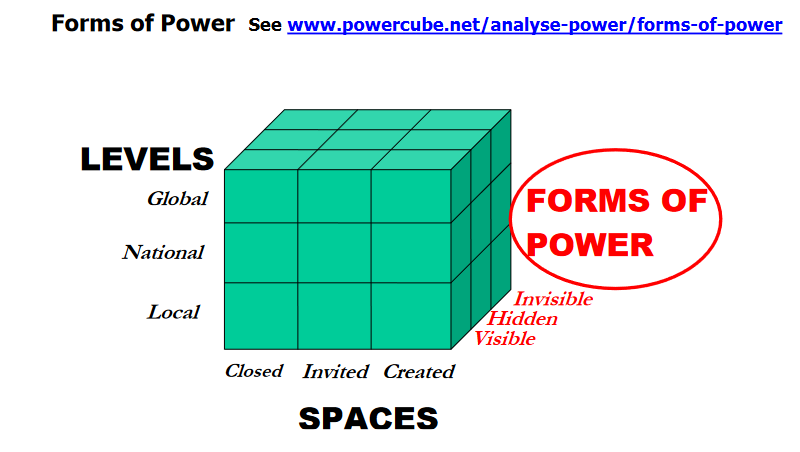● Tool: PARTICIPATORY POWER ANALYSIS

Power analysis is a process that can help networks and groups navigate the different dimensions of power, to understand how social issues are shaped and what change could be achieved to improve the lives of the communities those networks and groups are working with.
Power is a complex phenomenon and a person who has power in one context, can be relatively powerless in another.
We do not see power as being held solely by the few, but rather as something that can be found in the hands of many, and can manifest itself in both positive and negative forms. This tool can be used to start thinking about how power impacts our individual lives, communities, and networks – in both positive and negative ways. It can be useful to understand power dynamics within our networks and how they shape the challenges we face or the benefits they can give us when understood and used appropriately.
DURATION (min/max): 1h 30 min approximately
MATERIALS/REQUIREMENTS:
Blank A4 papers and colourful pencils or markers. The descriptions of different power types in the group might be handy
ABSTRACT:
This tool explores the different ways in which power can be understood and analysed, using the power frameworks to explore the different ways in which they can help to achieve a better understanding of how power operates within your networks.
This is both an individual and group exercise, it can be adjusted to each setting. First, reflect on how a participatory power analysis can benefit your network as well as individual development within your network – reaching your full potential but also feeling safe with those around you.
CONTENT
To correctly prepare for this workshop, the facilitator must read “Power, A Practical Guide for Facilitating Social Change”. Especially the frameworks 2(a) – the expressions on Power – and 2(b) – Faces of Power Spaces.
Start by asking people to think about a personal experience of power or powerlessness. It may be a positive or negative experience, drawn from either their personal or professional life. Ask them to express creatively this experience, e.g. an abstract drawing, writing, or a single word that reflects their story. After this reflection form pairs or groups of 3-4 (depending on how many people are involved in the workshop), to take turns sharing their story. Remind them to switch storytellers halfway through the time allotted.
The stories can then be used to explore ways in which power can be defined. This can be done by working in pairs or small groups to discuss a definition and then as a group to agree on one definition, by completing the sentence – ‘Power is….’ Or the various meanings of power can be discussed as a large group.
Some questions and reflections for the workshop:
-
Is it possible to agree on one definition of what power is?
-
What new light do our definitions of power shed on our understanding of achieving social change?
The facilitator should use their familiarity with the power frameworks to identify the types of power arising in the stories. For example, notice the difference between stories in which there is visible domination or ‘power over’ and those with more subtle or ‘invisible’ power (e.g. discrimination based on gender, ethnicity or age).
Further reflection:
-
Inner power in your network: Analyse the different power dynamics in your network as a team, and think of power also as something positive – empowerment. How does power affect your network?
-
External power in your network: What power leads to a thriving network? How can we use power to launch our network? e.g. the power of community.
These questions can be good to reflect on as a team after the workshop, once the different expressions of power are better understood. It can help build trust, connection and empathy within your network. Moreover, analysing power structures is a good tool to better understand the challenges and limitations we face and what we can do to transform the “negative power” – or power over - into “positive power” – power within or empowerment.

Resources:
Power: A Practical Guide for Facilitating Social Change
